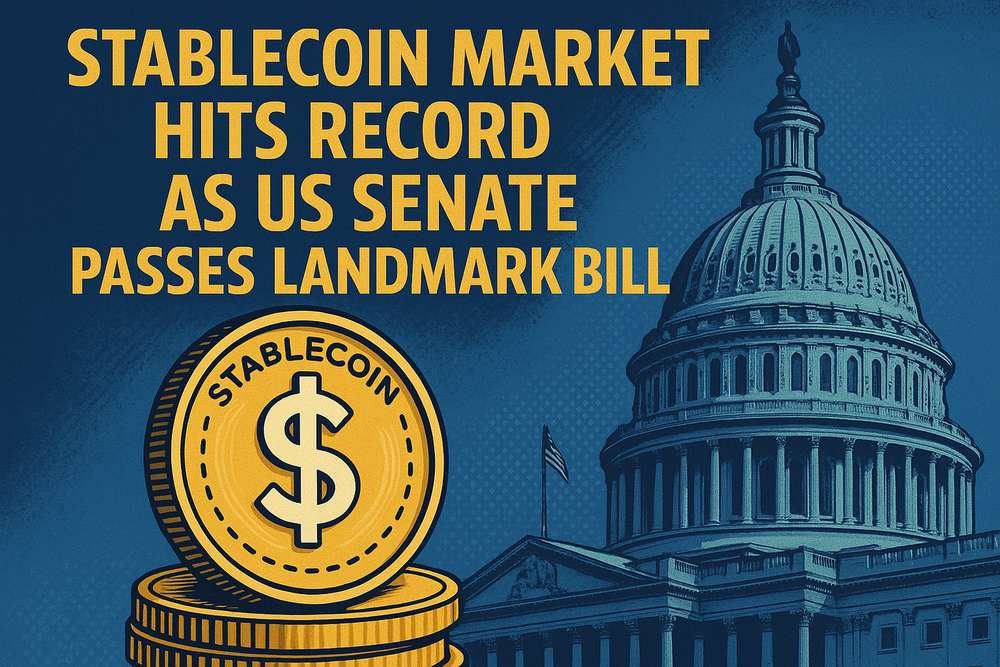The U.S. Senate handed the GENIUS Act with a bipartisan 68–30 vote on June 17, 2025, establishing the primary federal regulatory framework for stablecoins. This legislative milestone coincides with the stablecoin market reaching an all-time excessive valuation of $250 billion, signaling renewed institutional confidence in cryptocurrency markets. The invoice now strikes towards President Trump’s desk for anticipated signing earlier than the August congressional recess.
Senate Banking Committee Chairman Tim Scott hailed the laws as “a daring step ahead for American management and monetary innovation.” The GENIUS Act (Guiding and Establishing Nationwide Innovation for U.S. Stablecoins) goals to resolve longstanding regulatory ambiguities which have hindered stablecoin improvement in america. Its passage marks a major victory for the crypto trade after years of legislative gridlock.
Beneath the brand new framework, stablecoin issuers should keep 1:1 reserves in U.S. {dollars} or equally liquid property, with obligatory month-to-month reserve disclosures. The laws creates three pathways for authorized issuance: by way of insured banks, federally licensed non-bank entities, or state-regulated issuers dealing with below $10 billion in stablecoins. Overseas issuers could function in U.S. markets if deemed compliant with “comparable” rules by the Treasury Division.
Regulatory Framework Particulars
The GENIUS Act introduces a number of essential safeguards for customers and monetary programs. All permitted issuers should adjust to Financial institution Secrecy Act necessities for anti-money laundering (AML) and counter-terrorism financing. The laws explicitly excludes stablecoins from securities classification, offering authorized certainty absent in earlier regulatory approaches.
Key compliance necessities embrace:
- Reserve property should be held in money, Treasury payments, or repurchase agreements with maturity below 90 days
- Every day redemption ensures for stablecoin holders
- Congressional and govt department officers should disclose holdings exceeding $5,000
- Enhanced chapter protections for depositors
Political Dynamics and Considerations
Regardless of bipartisan help, the invoice confronted opposition from outstanding Democrats together with Senator Elizabeth Warren, who argued the laws was “worse than no invoice in any respect.” Warren led unsuccessful efforts so as to add amendments addressing bank card charges and restrictions on authorities officers cashing in on stablecoin ventures.
Republican management averted open modification processes after proposals threatened to derail the invoice. Over 100 amendments have been proposed, together with measures to stop massive tech platforms from issuing stablecoins and block high authorities officers from trade investments. These have been finally excluded from the ultimate model.
Privateness advocates expressed concern about Treasury’s expanded transaction monitoring authority, whereas banking trade representatives questioned how reserve necessities would possibly affect conventional deposit fashions. Treasury Secretary Yellen emphasised that the foundations would “steadiness innovation with monetary stability dangers” in implementation.
Market Impression and International Positioning
The stablecoin market’s report valuation displays anticipation of regulatory readability, with main issuers like Tether and Circle anticipated to hunt federal licensing. Business analysts undertaking accelerated institutional adoption because the U.S. establishes itself as a regulated hub for dollar-pegged digital property.
President Trump’s vocal help for cryptocurrency—calling himself America’s first “crypto president”—signaled administration priorities. The invoice positions the U.S. to compete with jurisdictions just like the EU and UK which have superior crypto asset frameworks. Overseas issuers should now display regulatory equivalence to entry U.S. markets, creating potential benefits for American corporations.
Market observers notice that whereas the GENIUS Act reduces authorized uncertainty, challenges stay in harmonizing state and federal oversight. The laws grants states major regulatory authority for issuers under the $10 billion threshold, creating a possible patchwork of necessities.
Set up Coin Push cell app to get worthwhile crypto alerts. Coin Push sends well timed notifications – so that you don’t miss any main market actions.
The GENIUS Act essentially reshapes America’s method to digital property, offering the regulatory certainty that establishments require for vital capital deployment. Because the invoice advances to the White Home, market contributors anticipate accelerated innovation in fee programs and digital asset infrastructure. This laws could finally decide whether or not the U.S. leads or follows within the subsequent evolution of world finance.
- Stablecoin
- A cryptocurrency pegged to a secure asset just like the U.S. greenback, designed to reduce worth volatility.
- GENIUS Act
- Laws establishing federal oversight for stablecoin issuers, requiring reserve backing and shopper protections.
- Financial institution Secrecy Act
- U.S. regulation requiring monetary establishments to help authorities businesses in detecting and stopping cash laundering.
- Cost Stablecoin
- Digital property redeemable for mounted worth, falling below the GENIUS Act’s regulatory framework.
This text is for informational functions solely and doesn’t represent monetary recommendation. Please conduct your individual analysis earlier than making any funding choices.
Be at liberty to “borrow” this text — simply don’t overlook to hyperlink again to the unique.


Editor-in-Chief / Coin Push Dean is a crypto fanatic primarily based in Amsterdam, the place he follows each twist and switch on this planet of cryptocurrencies and Web3.
